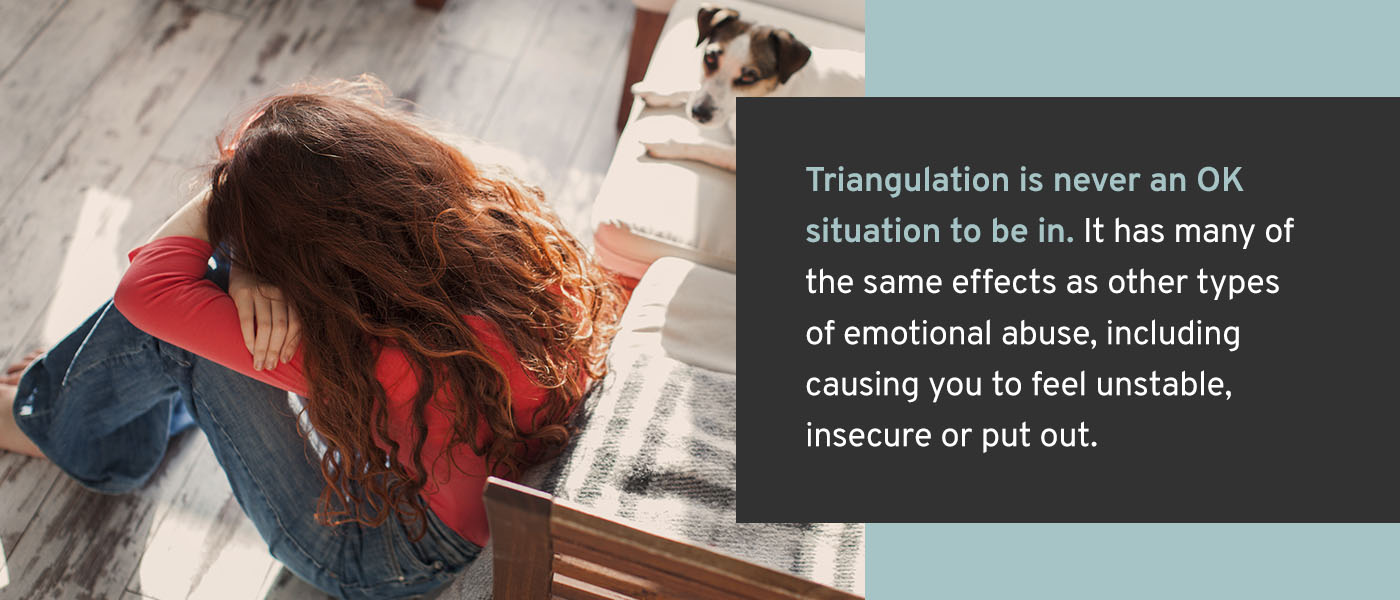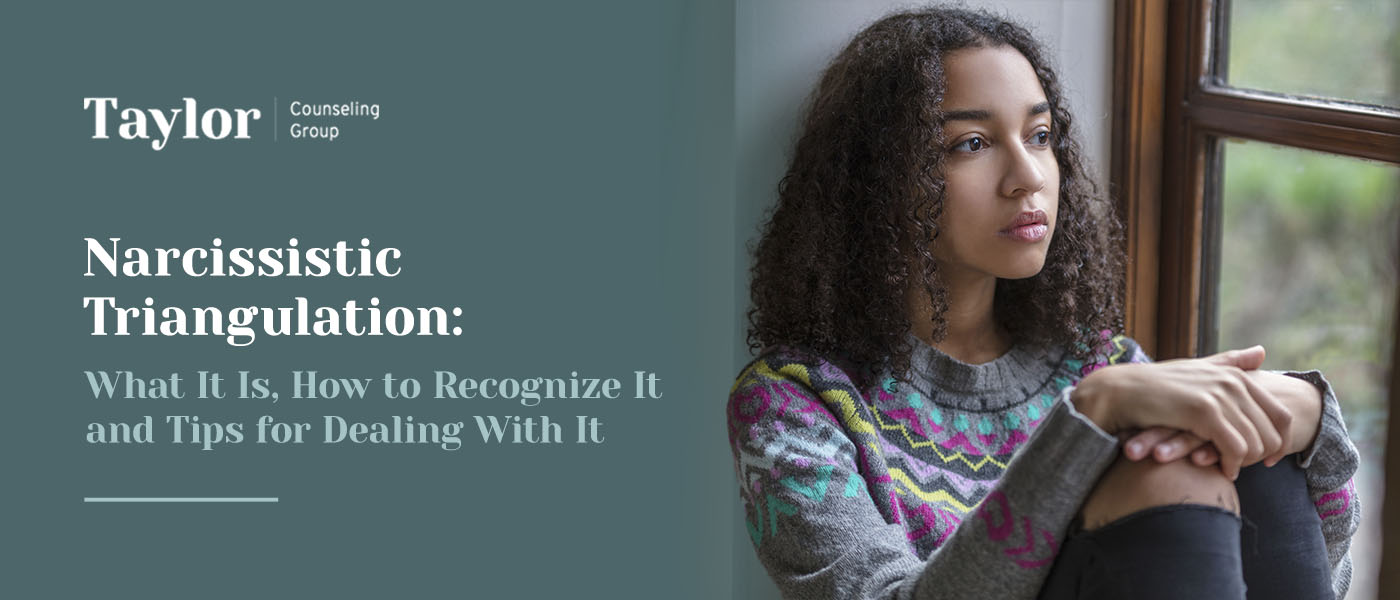Triangulation is a damaging and toxic manipulation strategy, whether the person instigating it is aware they are doing it or not. If you feel like you’ve been a victim of triangulation or other narcissistic behaviors, help is available.
Table of Contents
- What Is Narcissistic Triangulation?
- Examples of Narcissistic Triangulation
- Tips for Dealing With Narcissistic Triangulation
- Set and Stick to Your Boundaries With Help From Taylor Counseling Group
What Is Narcissistic Triangulation?
Triangulation is when someone brings a third party into an existing relationship in an effort to manipulate or control the other person. They might also engage in triangulation to diffuse a situation, “tip the scales” or detract from the real problem at hand. People who triangulate typically possess narcissistic traits, though anyone can employ this tactic.
Examples of Narcissistic Triangulation
Triangulation looks different depending on the nature of the relationship between those involved, but it often pits two individuals against each other in a way that benefits the instigator.
It can be difficult to recognize triangulation, especially if you’re the third party involved — you might feel stuck between caring about the other two and feeling overwhelmed by your newfound position. It might feel rude or disrespectful to brush off the instigator’s efforts to involve you.
If you’re on the receiving end of the manipulation, it might feel isolating or scary. It could seem like you’re outnumbered or that you have to do whatever is necessary to win over the instigator’s affections.

Triangulation is never an OK situation to be in. It has many of the same effects as other types of emotional abuse, including causing you to feel unstable, insecure or put out. It could also put you in an awkward or unsafe position with the others involved. Ultimately, triangulation threatens your self-worth and well-being.
Here are some examples of triangulation — if any of these feel familiar, it might be time to remove yourself from the situation or seek help.
Parent-Child Triangulation
Parent-child triangulation is particularly harmful, as adolescents victimized by this tactic are more likely to learn to meet their needs in the same manipulative way. It also creates an environment of conflict, which research shows causes adolescents to feel less familial cohesion. These are ways triangulation may manifest in a parent-child relationship:
- The parent complains about or criticizes the other parent to the child.
- The parent blames the child for their parental conflict.
- The child is used as a way to diffuse an argument between the parents.
- A parent asks the child to take a side in a parent conflict.
- The child is used as a messenger between the two parents, often when those parents are separated or divorced.
- The parent discloses details about the relationship to the child to influence how they feel about the other parent.
- A parent treats one child as the “golden child” and the other as a scapegoat.
Triangulation in Romantic Relationships
Triangulation is common in romantic relationships where one person has narcissistic tendencies, as the relationship is likely already unstable with manipulation, coercion or abuse. One common tactic is for the instigator to bring in either another romantic interest or a platonic friend and use that relationship to instill jealousy or stir up an emotional response.
They might enjoy making the two individuals “play” for their attention and affection, or they may use the third party as a way to manipulate their partner into doing something.
Platonic Triangulation
Triangulation can also occur in platonic relationships. For example:
- A friend might bring you into their romantic conflict as a way to manipulate their partner or diffuse the situation.
- You might be asked to take a side when two friends are fighting.
- A friend might use a third party to make you jealous or use you to make someone else jealous.
Tips for Dealing With Narcissistic Triangulation
Every instance of narcissistic triangulation is different, and you may play the part of the victim or the third party at different points in your life. Here are some tips to help you navigate the waters when you encounter these situations:
- Set boundaries: Take some time to consider what you are and aren’t comfortable with, and use that to establish boundaries that you stick to. Practice saying no, even when the person might not accept it as an answer. You might benefit from working with a professional therapist or counselor to discover what works best for you, especially if you’re dealing with complex familial relationships.
- Respond thoughtfully: Try not to lead with an emotional response when you encounter triangulation — it’s much easier to stick to your boundaries and understand what’s happening if you don’t give in to anger. Maintain a respectful tone, but be assertive about the pattern you’re seeing. Let them know that while you may be empathetic to the situation, you won’t engage in this situation.
- Get an outside perspective: Being involved in a triangulated relationship can make things fuzzy and hard to understand without help from an outside perspective. If you’re struggling to identify what you’re experiencing or want to confirm these patterns with an uninvolved party, consider trusting in a friend, family member or therapist. They may be able to offer perspective on the situation and help you recognize toxic signs.
- Diversify your social group: Build different types of relationships with multiple people instead of making one person your entire world. Develop a healthy balance between your romantic partner, friends, family, work and alone time. Having a support group made up of different individuals will establish a stronger foundation for walking away when you need to.
- Distance yourself: You can sometimes diffuse a toxic encounter by excusing yourself to do something else. For example, if you notice a friend might be involving you in their relationship with someone else, let them know you have a previous commitment and get away from the situation. That said, a relationship can’t and shouldn’t be salvaged in many cases. If someone continuously instigates a triangulated relationship — whether to manipulate you or someone else — it’s time to distance yourself from that person or exit their life entirely.
Set and Stick to Your Boundaries With Help From Taylor Counseling Group
It’s hard to recognize triangulation, especially if you’re dealing with a person who has narcissistic traits. It’s crucial that you set and exercise boundaries to protect yourself. The professionals at Taylor Counseling Group are here to help you identify toxic behaviors and harmful relationships.
Explore more resources about establishing boundaries with narcissists, or schedule your first appointment today. We have offices across Texas, including in the Dallas-Fort Worth, Houston, San Antonio, Austin and Waco areas.
Related Articles & Resources:
- How to Deal With A Narcissistic Family Member
- 10 Ways To Set Boundaries With Difficult Family Members
- Signs of Gaslighting and How to Respond
- The Impact of a Narcissistic Sibling
- Covert Narcissists: Signs and How to Respond to One
- Setting Boundaries For Self-Empowerment
- Is Narcissism A Personality Disorder?
- Individual Counseling







